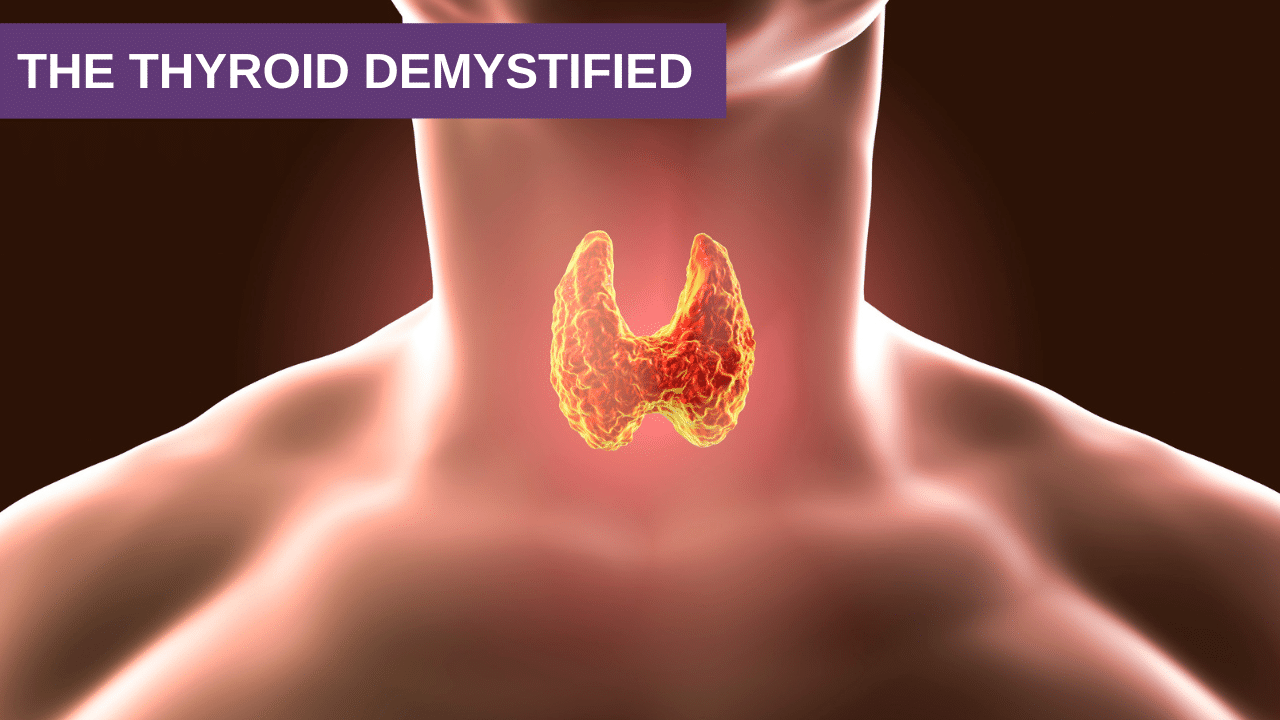Hormones affect your thyroid function especially estrogen. The dramatic shifts of pregnancy and menopause put women at greater risk for thyroid disorders and the risk increases with age. The risk increases if anyone in your family has thyroid disorders. Exposure to radiation and autoimmune disorders also increase your risk of thyroid problems.
Recognize When Your Thyroid is Off
Since your thyroid controls your metabolism, it affects everything. Low thyroid function is called hypothyroidism while too much thyroid hormone production is called hyperthyroidism.
For women, one of the first signs of thyroid dysfunction is heavier irregular periods. Over time thyroid disorders can cause infertility. When you’re hypothyroid everything is slowed down. Your blood pressure and heart rate are low. You’re constipated and your memory is foggy. Your moods are depressed. Your muscles ache and you feel weak. You’re fatigued. You put on weight. You may have just enough energy to get your work done but if you sit down, you fall asleep.
When you make too much thyroid hormone, everything speeds up. You’re anxious, jittery, your heart races, your blood pressure is high, your eyes bulge. Your brain races but you’re thinking is foggy. Your metabolism is so high, you have diarrhea and you lose weight rapidly.
Sometimes your thyroid enlarges so much that you have difficulty swallowing.
Symptoms of Thyroid Problems in Women
- Period problems
- Muscle aches and weakness
- Brittle hair, nails, and dry skin
- Puffy dry eyes
- Hot/Cold intolerance
- Change in bowel movements
- Abnormal blood pressure, heart rate, and cholesterol levels
- Fatigue
- Sudden weight change
- Brain fog
- Mood swings
- Difficulty swallowing
Support Your Hypothamic-Pituitary-Thyroid Axis
What if you have symptoms of a thyroid disorder and you go to your doctor for a blood test, but your doctor says your blood work looks fine? How can that be when you clearly have symptoms of hypothyroidism or hyperthyroidism?
Well, your blood work may be within normal limits but it’s not your normal.
I like to look at my patients’ bloodwork through the lens of whether or not their hypothalamic-pituitary-thyroid axis is functioning properly. Remember it’s a negative feedback system. If your thyroid hormones T4 or T3 are low then your TSH will be high indicating hypothyroidism. If your T4 or T3 is high then your TSH will be low indicating hyperthyroidism. BUT if your TSH is not responding to changes in your thyroid hormone production that is clearly miscommunication in the HPT axis.
Supporting your hypothalamus can clear up the miscommunication and get your thyroid functioning normally. That’s one of the benefits of Genesis Gold® – to balance your thyroid hormones through phytonutrients with a special amino acid blend specifically formulated to optimize hypothalamic and thyroid function. Genesis Gold® is especially beneficial if you have autoimmune thyroiditis as it helps heal your autoimmunity while improving your thyroid function.
Keep Track of Your Body Temperature
Now how do you know if your thyroid is healing? Luckily your basal body temperature will reflect thyroid function. Your thyroid hormones – specifically T3 – stimulate energy production. The more energy you produce, the faster your basal metabolic rate is, and the more normal your body temperature becomes. A low core body temperature is a classic sign of hypothyroidism or low thyroid function. Your thyroid hormone production might be within normal limits but T3 is not getting into your cells. T3 activates mitochondrial energy production. An active basal metabolic rate stimulates your hypothalamus to keep your body temperature around 98.6 degrees Fahrenheit (37 degrees Celsius).
Now first thing in the morning when you wake up your body temperature should range between 97.8 and 98.2 degrees Fahrenheit. Within a few hours it’ll rise to normal – 98.6.
Anything below 97.8 is considered low body temperature and indicates poor T3 activity. So you can check your temperature to determine thyroid hormone function at the cellular level.
It’s best to take your temperature orally (by mouth) to determine core body temperature.
Under the arm is not accurate especially in perimenopausal and menopausal women as their skin temperature runs hot while their core is cool if they’re hypothyroid. Use a mercury thermometer for the most accurate reading. If you’re a reproductive-aged woman, your temperature changes throughout your menstrual cycle so be sure to check it on the same day of the cycle every month.
One of the benefits of taking Genesis Gold® is that it helps T3 get into your cells which will be reflected by a more normal body temperature, more energy, and higher metabolism.
Now you know the difference between hypothyroidism and hyperthyroidism yet it’s not easy to heal your thyroid without balancing the rest of your hormones too. So I created the Hormone Reboot Training for you to discover how to balance all your hormones and get the support you need to heal your thyroid problem. Join me for free.

Research Reference: Hypothyroidism – new aspects of an old disease, Thyroid’ Issues May Really Be Hypothalamic, Hypothalamic-pituitary-thyroid (HPT) Axis Functioning in Anxiety Disorders. A Systematic Review.
*Statements not reviewed by the FDA.



0 Comments